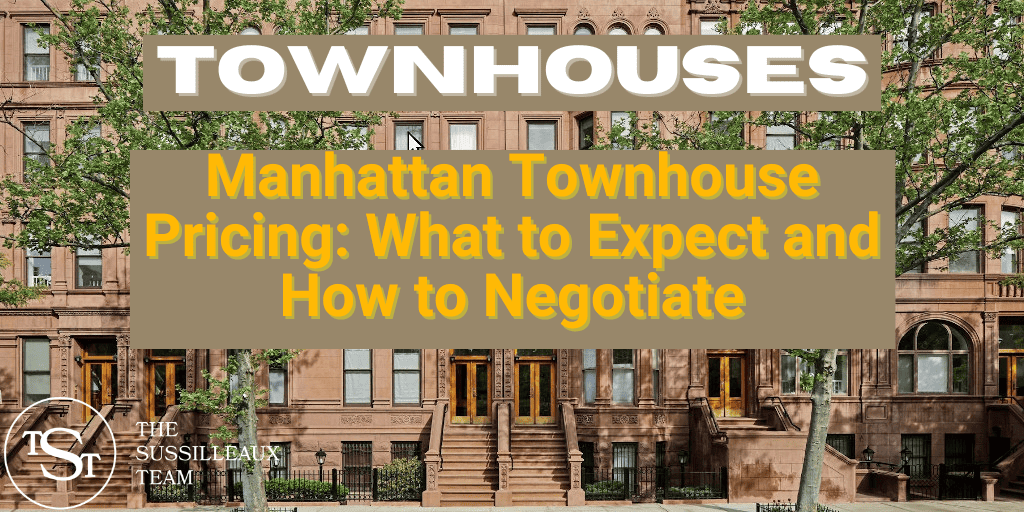Understanding Manhattan Townhouse Pricing
When it comes to Manhattan townhouses, pricing can be quite complex. To navigate this market successfully, it’s essential to understand the factors that influence townhouse prices.
I, along with my wife Dina, have been New York City real estate brokers for over 20 years. In that time we have successfully helped our clients in the sale, purchase and renting of Manhattan Townhouses. In our experience, having a firm grasp of the current market is critical to your success, whether selling or buying.
Factors Influencing Townhouse Prices
There are many key factors that can impact the price of a Manhattan townhouse. Some of these a re common to real estate in general, and some are specific to Manhattan townhhouses.
Location and Neighborhood
The neighborhood and location of a townhouse play a significant role in its price. Prime locations in desirable neighborhoods such as the Upper East Side, Greenwich Village, and SoHo generally command higher prices due to their proximity to parks, transportation, shopping, and dining.
While location and neighborhood always matter, it is especially important for townhouses. The most desirable townhouses are quiet tree-lined side streets lined with beautiful townhouses.
Architectural Style and Historic Significance
The architectural style and historical significance of a townhouse can also affect its price. Townhouses with distinct architectural features or a rich history may command a premium.
Historical significance is especially relevant for townhouses. They are not merely buildings, but a window into a charming previous version of the city and the lifestyle of the former owners.
Size, Layout, and Condition
Larger and wider townhouses with more bedrooms, bathrooms, and outdoor space usually have higher price tags. Additionally, the layout and overall condition of the property will influence its price. Renovated townhouses with modern amenities often fetch higher prices than those requiring extensive renovations.
Condition is critical because of the cost of renovating a NYC townhouse. I have investor clients who buy shells of buildings, and then spend millions to bring them up to pristine condition.
PRO TIP: Building Width
I am always careful to explain the disproportional impact that building width has on a property’s value to my clients.
Because of the nature of the lots that townhouses are built on are long and narrow, townhouses can appear cramped because there are no windows along the length of the property. That’s why in the world of townhouses, width is king. Therefore, all other things being equal, a building’s width has a tremendous impact on its’ value.
Market Conditions and Inventory
Market conditions and inventory levels can also impact townhouse prices. High demand and low inventory often lead to increased prices, while a surplus of available properties may result in lower prices.
We specialize in townhouse sales, and through -years of real-world experience understand that the NYC townhouse market isn’t necessarily in line with the general real estate market for condos and co-ops. It’s important rely on brokers like us with the expertise in the market to guide you.
We’re always happy to chat with you and talk all about the NYC townhouse market. Feel free to reach out to Michael and Dina.
Pricing Trends and Comparative Market Analysis
To make an informed decision when purchasing a Manhattan townhouse, it’s crucial to understand pricing trends and conduct a comparative market analysis.
Analyzing Manhattan Townhouse Sales Data
Your real estate broker should provide you with recent sales data for townhouses in your desired neighborhoods to identify pricing trends. This information will help you determine whether prices are rising, falling, or remaining stable.
Identifying Comparable Properties
Identify properties similar to the townhouse you’re interested in to compare their prices. Look for townhouses with similar width, square footage, layouts, architectural styles, and conditions in the same neighborhood.
Understanding the Price per Square Foot
Calculate the price per square foot for each comparable property to help determine a fair price for the townhouse you’re considering. This metric allows you to make a more accurate comparison between properties.
The Importance of Building Width
By their nature New York City Townhouses dimensions are typically longer than they are wide. Wider homes provide a greater sense of space, more architectural options, more garden space, and generally more natural light. Building widths generally range from 16 feet to 25 feet wide.
Monitoring Market Fluctuations
Keep an eye on market fluctuations to ensure you’re making an offer at the right time. Be aware of changes in interest rates, inventory levels, and economic indicators that could impact the real estate market.
Preparing for Negotiations
Before entering negotiations for a Manhattan townhouse, take the following steps to ensure a successful outcome.
Establishing Your Budget and Priorities
Determine your budget and establish your priorities, such as location, size, and architectural style. Knowing your must-haves and deal-breakers will help you make informed decisions during negotiations.
Obtaining Mortgage Pre-approval
Get pre-approved for a mortgage to demonstrate your financial readiness to potential sellers. A pre-approval letter can make your offer more attractive, especially in a competitive market.
Working with an Experienced Real Estate Agent
Partner with a real estate agent who specializes in Manhattan townhouses. An experienced agent will provide valuable insights, guide you through the negotiation process, and advocate on your behalf.
Case Study: Inexperienced real estate brokers
Background:
I had an experience not too long ago with “Jane”, a newly licensed real estate broker, who was representing her uncle in purchasing a beautiful brownstone on the Upper West Side that Dina and I had listed for sale. Jane had enthusiasm and good intentions, but lacked the intricate knowledge required for such a transaction.
The Challenge:
The buyer expressed keen interest in the townhouse. However, as negotiations began, Jane’s inexperience became evident. She struggled with understanding the unique nuances of townhouses compared to apartments; how historical significance affects value, the responsibility of maintaining a building, and the specific market dynamics of such properties. Her negotiation tactics were ill-suited for the high-stakes environment, and she risked undervaluing the property, offending the sellers, and losing the deal altogether.
The Turning Point:
Recognizing the potential downfall of the transaction, Dina and I, stepped in and brought our expertise and years of experience to bear on her side of the transaction. While maintaining 100% loyalty and fiduciary responsibilities to our clients, we were able to facilitate negotiations by helping her uncle understand the particulars of the deal process.
The Resolution:
With our guidance, Jane was able to present a more suitable offer. The fact that this was not our first rodeo enabled us to communicate effectively to both parties and instill a sense of trustworthiness in the process that both parties appreciated. The deal closed, and everyone was happy. (Jane even approached us about joining our team after the transaction!)
Conclusion:
This case underscores the importance of experience and expertise in the real estate industry, especially when dealing with premium properties like Manhattan townhouses. While enthusiasm and dedication are commendable, they must be paired with knowledge and understanding to ensure successful transactions.
Michael and Dina are happy to sit down with you and discuss your situation and answer any questions you may have about any aspect of the process. You can contact them HERE.
Developing a Negotiation Strategy
We work with you to develop a negotiation strategy based on your priorities, market conditions, and the seller’s motivations. This plan includes your initial offer, potential counteroffers, and your maximum price.
We also do as much “opposition research” as possible to determine the mindset and bargaining position of the seller. Putting yourself in the shoes of all parties is often a winning strategy.
Negotiating Manhattan Townhouse Prices
Once you’re prepared, it’s time to begin negotiating.
Home Inspection
Most NYC townhouses are over 100 years old. You must have an understanding of the buildings’ HVAC systems, plumbing, electrical, roof, and façade condition, pest problems, and overall structural condition prior to making an offer. A licensed home inspector can provide a complete report covering everything you need to know.
PRO TIP: Get the best inspector you can find
I have seen some crazy things during townhouse inspections. A great inspector can give you the confidence to move forward, while a poorly qualified one can either miss significant problems, or misdiagnose minor issues as major flaws. I am very aggressive with my clients that they choose an inspector that I am familiar with, because this is too important to mess up.
Check the inspector’s references!
Making an Offer
Your broker can submit an offer based on your comparative market analysis, taking into account the pricing trends and price per square foot of comparable properties. Ensure your offer is competitive yet realistic.
Communicating Your Justification for the Offer
If your offer differs significantly from the asking price, you will want your broker to provide a clear rationale based on your research and analysis. This justification can help sellers understand your perspective and may make them more receptive to negotiation.
Handling Counteroffers and Multiple Offers
If the seller counters your offer, evaluate it in the context of your priorities and budget. Be prepared to make concessions or walk away if the counteroffer does not align with your goals. In situations with multiple offers, consult your agent to determine the best course of action.
Other Factors
Real-world negotiations are generally far more complicated than these basic elements. This is where my experience, knowledge, and negotiating skills really shine. The numbers involved are large, and even a small percentage difference in outcome represents a lot of money. Wouldn’t it be best to maximize those differences in your favor?
Contingencies and Closing Costs
During negotiations, consider discussing contingencies such as home inspections, financing, and appraisal. You may also negotiate closing costs, which can include attorney fees, title insurance, and transfer taxes.
Closing the Deal on Your Manhattan Townhouse
Once you have successfully negotiated a deal, take the following steps to finalize the purchase.
Finalizing the Contract Terms
Review the contract carefully, ensuring all agreed-upon terms are included. Consult with your real estate agent and attorney to address any concerns or discrepancies.
Scheduling the Bank Appraisal
If financing, your lender will require an appraisal to assess the townhouse’s condition and value. If issues arise during these evaluations, you may need to negotiate further with the seller to address them.
Securing Financing and Finalizing the Mortgage
Work with your lender to secure financing and finalize your mortgage. Be prepared to submit additional documentation as needed to satisfy your lender’s requirements.
Preparing for the Closing and Moving In
Coordinate with your agent, attorney, and lender to schedule the closing date. Ensure all required paperwork is completed and funds are available for closing. Once the transaction is complete, it’s time to move into your new Manhattan townhouse!
Additional Tips for a Successful Manhattan Townhouse Purchase
Beyond understanding pricing and negotiation strategies, consider the following tips to increase your chances of success when purchasing a Manhattan townhouse.
Be Patient and Persistent
The Manhattan townhouse market can be competitive, so be prepared to exercise patience and persistence during your search. Don’t be discouraged by setbacks, and continue to evaluate new listings as they become available.
Build a Strong Support Team
Assemble a team of experienced professionals, including your real estate agent, attorney, mortgage lender, and potentially an architect or contractor if you plan on renovating. This support network will help you navigate the complex process of purchasing a Manhattan townhouse and ensure you make informed decisions throughout.
PRO TIP: When choosing an attorney, it is critical that they have experience in Townhouse transactions. Your real estate agent should be able to recommend a number of qualified attorneys that you can choose from.
Keep an Open Mind
While you may have specific preferences and priorities, being flexible and open-minded during your search can reveal opportunities that you may not have initially considered. Be prepared to compromise on certain aspects of the property if it meets your overall goals.
Don’t Overlook Potential Renovation Opportunities
Some Manhattan townhouses may require renovations or updates to meet your needs. Don’t be deterred by properties that need work, as they can often be purchased at a lower price and tailored to your preferences with the right renovation plan.
Stay Informed on Market Conditions
The real estate market is constantly evolving, and staying informed on market conditions can help you make well-timed decisions. Keep an eye on interest rates, inventory levels, and general economic factors that may impact the Manhattan townhouse market.
Conclusion
Purchasing a Manhattan townhouse is a significant investment, and understanding pricing, negotiation strategies, and market conditions is essential for success. By working with experienced professionals, conducting thorough research, and remaining patient and persistent throughout the process, you can secure the perfect townhouse for your needs and budget.
Further Reading
You can return to The Complete Guide to Manhattan Townhouses, go to the preceding article; How to Find the Perfect Manhattan Townhouse for Your Needs or read the next article: Financing a Manhattan Townhouse: Tips and Options
Frequently Asked Questions (FAQs)
- What is the average price per square foot for a Manhattan townhouse?
- How can I determine a fair offer for a specific Manhattan townhouse?
- What are some common contingencies to include in a Manhattan townhouse offer?
- Can I negotiate the price of a Manhattan townhouse listed as “non-negotiable”?
- How can I increase my chances of a successful negotiation when purchasing a Manhattan townhouse?
What is the average price per square foot for a Manhattan townhouse?
The average price per square foot for a Manhattan townhouse can vary greatly depending on factors such as location, condition, and architectural style. While it’s difficult to provide an exact number, in recent years, the average price per square foot for a Manhattan townhouse has typically ranged between $1,000 and $3,000. Keep in mind that this is just a rough estimate, and specific properties may fall outside of this range. It’s important to research recent sales data and analyze comparable properties in the area to get a better understanding of the market and pricing for a specific townhouse.
How can I determine a fair offer for a specific Manhattan townhouse?
To determine a fair offer for a specific Manhattan townhouse, you’ll want to conduct a comparative market analysis by researching recent sales of similar properties in the same neighborhood. Look at factors such as width, size, architectural style, condition, and any unique features. Your real estate agent can help you gather this information and provide insights on the current market conditions. Additionally, consider the property’s days on the market and any potential competition from other buyers. Ultimately, your offer should be based on your analysis, budget, and personal priorities.
What are some common contingencies to include in a Manhattan townhouse offer?
Common contingencies to include in a Manhattan townhouse offer typically involve financing, inspection, and appraisal. A financing contingency allows you to back out of the deal if you’re unable to secure a mortgage. An inspection contingency gives you the right to have the property inspected by a professional and negotiate repairs or price adjustments based on the findings. An appraisal contingency protects you in case the property appraises for less than the agreed-upon purchase price, allowing you to renegotiate or walk away from the deal. Including these contingencies in your offer can help protect your interests during the buying process.
Can I negotiate the price of a Manhattan townhouse listed as “non-negotiable”?
While a Manhattan townhouse listed as “non-negotiable” may seem inflexible, there’s often still room for negotiation. Start by making a fair and well-researched offer based on your comparative market analysis. If the seller remains firm on their price, consider negotiating on other terms, such as closing costs, repairs, or the closing date. It’s important to approach the situation with a collaborative mindset and be willing to compromise. However, if the seller remains unwilling to negotiate, you may need to decide if the property is worth the asking price or if you should continue your search elsewhere.
How can I increase my chances of a successful negotiation when purchasing a Manhattan townhouse?
To increase your chances of a successful negotiation when purchasing a Manhattan townhouse, start by being well-prepared and informed. Research the market, understand the property’s value, and work with an experienced real estate agent who can help you navigate the process. Be realistic with your expectations and prioritize your needs and goals. Maintain open communication with the seller and demonstrate your seriousness as a buyer by being pre-approved for a mortgage and having your finances in order. Finally, be flexible and willing to compromise on certain aspects of the deal to reach an agreement that works for both parties.





